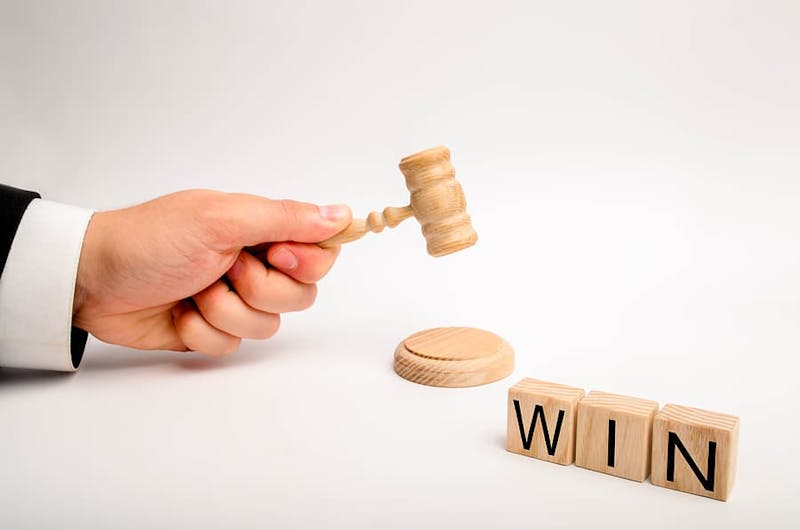Get a Free Consultation
2 minute response
24 hours a day, 7 Days a Week
Dedicated Trust Guss Intake Team

Life often throws curveballs. For some individuals, a personal injury is one of the curveballs they must deal with. Injuries come with pain and discomfort, missed hours at work, and medical bills. No matter what personal injury you suffer, you will face financial losses, logistical issues, and other inconveniences. You deserve compensation for all of these things, and you might be wondering what the chances of winning a personal injury lawsuit are.  Many factors can impact your chances of receiving a full settlement or a court award. One of the biggest positive factors is having a skilled attorney represent you. Studies show that personal injury victims with legal representation often receive more compensation than those who pursue their personal injury claim alone.A personal injury attorney is also the best resource for determining if you have a valid claim, how successful it might be, and how much compensation you might receive.
Many factors can impact your chances of receiving a full settlement or a court award. One of the biggest positive factors is having a skilled attorney represent you. Studies show that personal injury victims with legal representation often receive more compensation than those who pursue their personal injury claim alone.A personal injury attorney is also the best resource for determining if you have a valid claim, how successful it might be, and how much compensation you might receive.
In addition to representation from an attorney, several other factors can determine the success and value of your claim.
Can you or your attorney prove liability or that the other party was at-fault for your injuries? Generally, this means presenting evidence to establish that:
You must prove that you are seeking compensation from the correct party. The stronger the evidence you have to prove your claim, the more successful it is likely to be. Hiring an attorney can ensure that you have the proper evidence to prove the other party’s liability for your injuries.
In addition to proving liability, you must also prove the existence and value of your damages. As such, damages are just as vital to a personal injury claim as liability.
Economic damages, also called special damages, refer to the financial losses or expenses created due to your personal injury. Your lawyer can prove medical expenses with medical bills and receipts and establish lost wages with a wage verification statement from the injured individual’s employer. If the injured party had other reimbursable expenses, those are also usually proven with various bills, receipts, or statements.
Non-economic damages, also called general damages, aren’t monetary but impact victims in other ways. These damages are often more difficult to prove since there are no receipts or bills to prove their existence or value. Sometimes you can prove them with expert witnesses or friends and family as witnesses testifying to how the injury has changed the victim, their life, or their relationship with the victim. Pictures and videos of your injuries or the accident scene can also help prove these damages. Non-economic damages can include:
If your medical expenses are reasonable and necessary, you have a better chance of receiving fair compensation. Increased medical expenses typically lead to higher injury settlements or court awards if the medical costs are reasonable. Injured individuals should never assume that their insurance claims adjuster will just agree with the sum of medical or chiropractic bills they request compensation for.
Payment for most injury claims comes from auto, homeowner’s, business liability, or medical malpractice insurance policies that have limits of coverage, which are the maximum amount the insurance carrier will pay for an injury claim. If the claimant has severe or catastrophic injuries and the at-fault party has low injury coverage limits, the claims adjuster might pay the full coverage amount if their insured is the liable party. Depending on how you suffered injuries and the circumstances of your injury, auto insurance coverage for bodily injury claims can come from:
Each state regulates the minimum amount of auto coverage drivers must carry. The limits of available insurance can impact your compensation. For example, Texas requires 30/60/25 coverage for liability auto insurance coverage, which means drivers must purchase:
Suppose you suffered injuries in a car accident with three of your passengers. If the person responsible for your accident only had the minimum required coverage, the $60,000 limit will be all that covers damages for you and your passengers. However, if you had uninsured/underinsured motorist coverage, you may seek compensation from that policy plus the $60,000.
Your accident or injury location can significantly affect the amount of compensation you stand to receive. Insurance claims adjusters also consider venue and jurisdiction when deciding how much they are willing to pay for settlements. Jurisdiction refers to which court has the authority to handle your case. The venue is where your injury claim will go to trial if you decide to litigate your claim. Some venues are more favorable to injured individuals than to large insurance companies. As such, the adjuster will probably offer more money to settle your claim if you are in a venue with a history of awarding large sums for bodily injury cases.
Depending on the laws in your state and the types of damages you are entitled to receive, your compensation may also depend on personal injury caps. Due to tort reform laws, caps or limits are in place in some areas that limit the compensation an injured individual can receive in damages. Tort reform aims to keep personal injury claims out of litigation whenever possible and to prevent the expense of high-dollar awards from burdening innocent consumers. For example, medical malpractice claims often face compensation caps. These caps typically apply to non-economic damages and, if they apply to the case, punitive damages.
Personal injury lawyers can increase the value of your claim and the chances that it will succeed. Consider all that a personal injury attorney can do.
If a personal injury lawyer represents you, you don’t have to communicate directly with the insurance company or the claims adjuster. Instead, your attorney takes care of all communication. This saves you time and hassle, but it also gives you space to heal from your injuries. It also prevents you from accidentally saying something that may be detrimental to your claim.
An experienced lawyer will give you clear, fact-based legal advice. For example, yours will probably recommend that you don't give a recorded statement to the insurance claims adjuster on your own, even if they tell you they need your statement to continue with your claim. Your lawyer will guide you through the insurance claims process or, if you decide to litigate your claim, the steps of a lawsuit, explaining what they need from you, such as medical records related to your injury. The insurance company doesn’t have to and probably won’t tell you about the statute of limitations or legal deadline to file a claim in your state. However, your attorney will work with you to settle your claim or file a lawsuit before the deadline so that you don’t forfeit your right to compensation for your injuries.
Each state has personal injury and negligence laws with different deadlines and other rules. Your lawyer will explain whichever laws apply to your claim, how they might affect you, and what they can help you do about it.
If an attorney takes your case, it's probably a valid case they believe will be successful. The attorney can estimate your claim's worth and inform you about their fees. The attorney will ensure that compensation for severe injury cases accounts for potential future medical bills, pain and suffering, emotional distress, and your loss of income potential. If necessary, they may hire financial and actuarial experts to help establish your demand for full and fair compensation.
In some cases, more than one party or business can be held accountable for your damages. Your attorney will help identify each party and the sources of compensation available through them. For example, they can determine what insurance coverage the at-fault party carries and uncover harder-to-find payment sources.
Experienced lawyers have spent years negotiating claims with insurance claims adjusters. With so much experience, they frequently obtain the maximum compensation for their personal injury clients without needing to go to trial. By hiring an attorney, you let the claims adjuster know that they must offer a fair settlement or risk a personal injury lawsuit. Personal injury lawyers are skilled negotiators who don’t fall for the adjuster’s tactics like unsuspecting claimants who go it alone do. Your lawyer knows how to discuss the strengths of your claim and has the legal expertise to push back against allegations that can be detrimental to your case. Suppose there are multiple injury claimants for one accident and a limited amount of available insurance monies. In that case, your attorney will do everything in their power to get you your fair share.
While no one can predict the future, and there is no guarantee that you will win your personal injury lawsuit, you can certainly take steps to set it up for success. The primary step is to hire an experienced personal injury lawyer and follow their advice. Doing so increases your chances of a successful claim and full and fair compensation. When you hire a skilled attorney to represent you in your personal injury claim, whether it's a car accident, slip and fall, dog bite, or another personal injury case, you can rest assured that you do everything to help your claim succeed. Take the first step in receiving compensation for your injuries and reach out for legal assistance today. Most personal injury attorneys offer free initial consultations and don’t require any payments unless they obtain compensation on your behalf.
2 minute response
24 hours a day, 7 Days a Week
Dedicated Trust Guss Intake Team